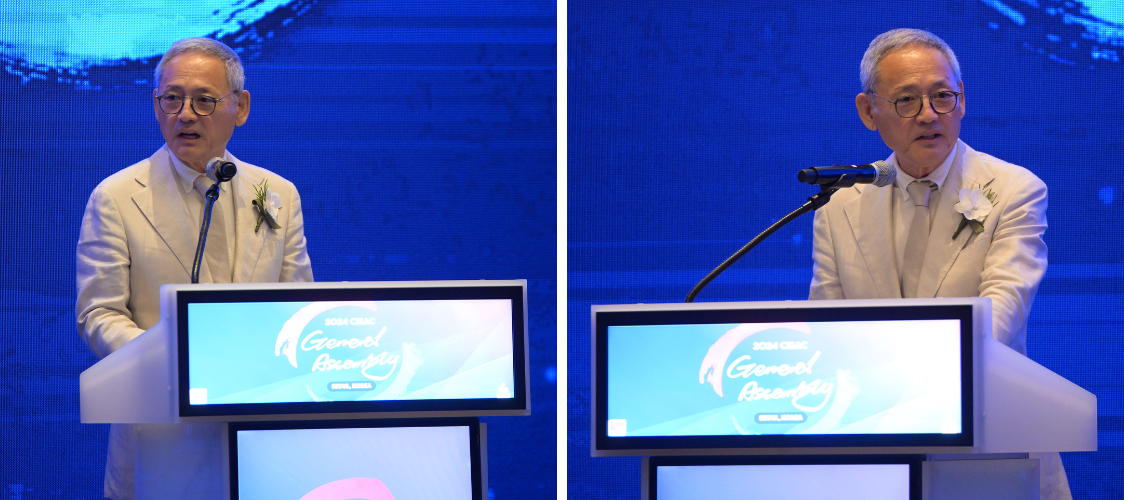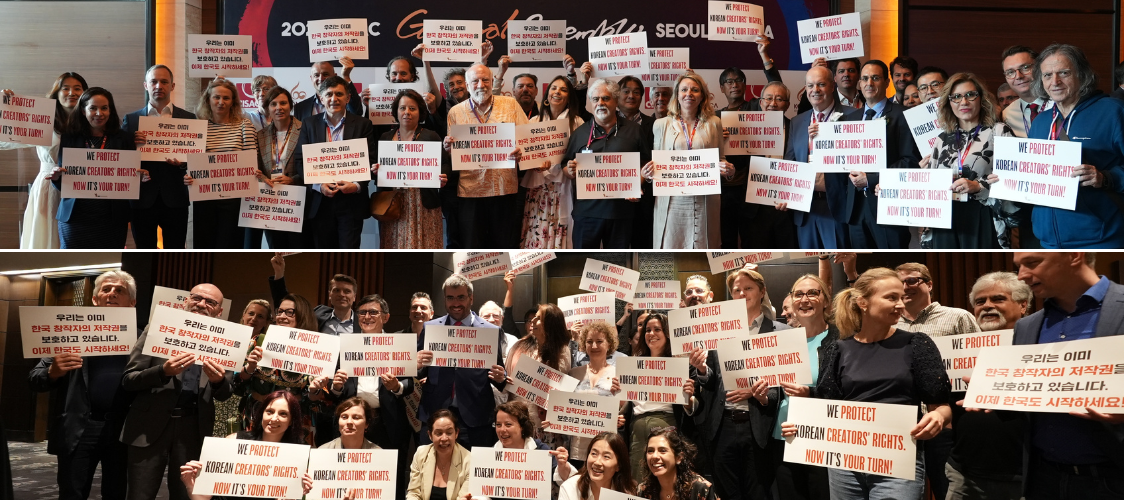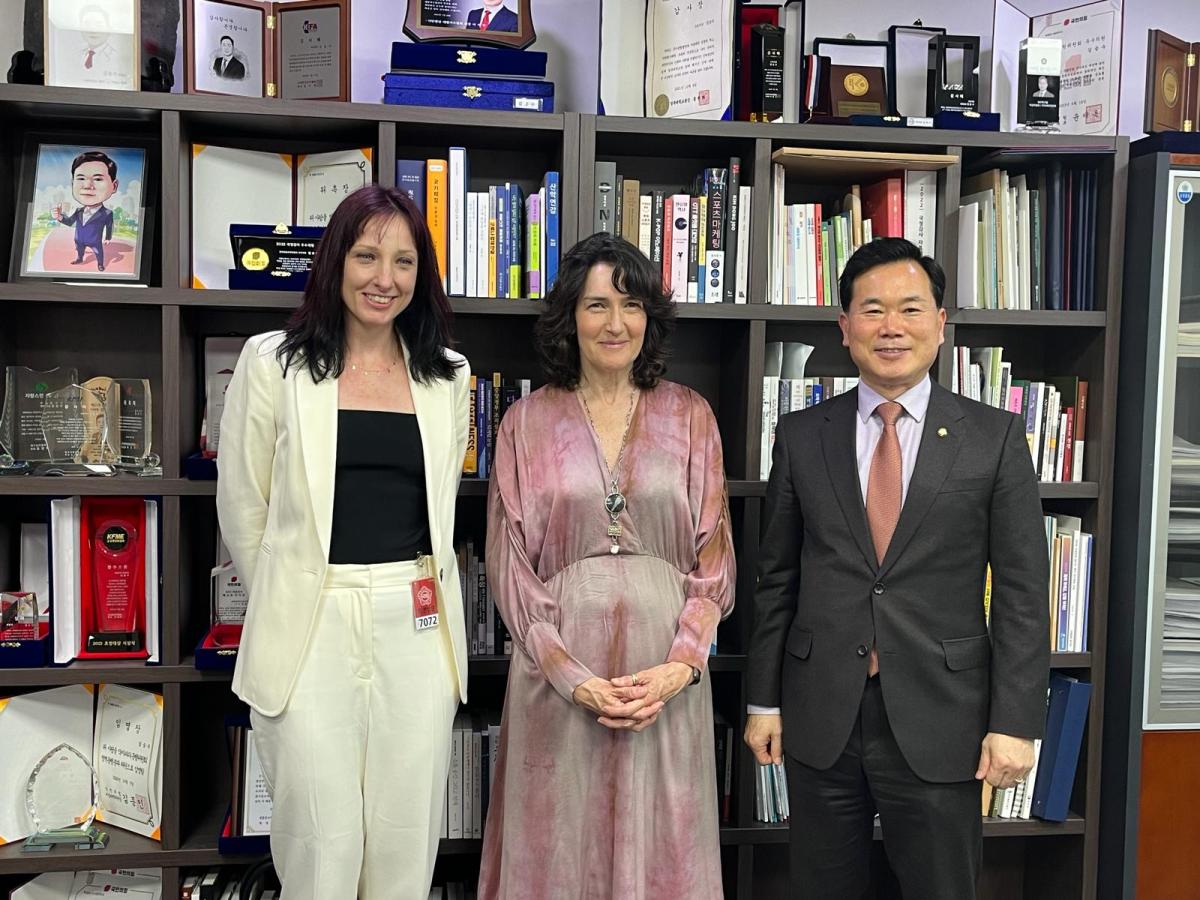The value, the threat and the call to action: AI dominates CISAC’s 2024 General Assembly
CISAC’s 2024 General Assembly drew more than 75 member societies to Seoul, with leading creators and policy makers joining a meeting that was inspired by the creative success story of Korea and dominated by the biggest issue of our times - artificial intelligence.
Full photo gallery for the CISAC General Assembly.
In addition to speeches and presentations, animated panels brought together CISAC member CEOs and creators to consider the main challenges facing the global CISAC community: translating creative endeavour into economic success; how AI affects licensing; how legislators are responding to AI; and reconciling two essential features of the CISAC world, competition and collaboration.
Korean Minister of culture talks vigilance on creators’ rights

Prior to the General Assembly, a CISAC delegation including CISAC Vice-Presidents Ángeles González-Sinde Reig and Arturo Márquez met with Korea’s Minister of Culture, Sports and Tourism Mr Yu In Chon. They discussed the world-beating success of Korea’s cultural industries and the need to constantly defend creators’ rights and the value of works.
The rapid rise of AI is a top priority that must be accompanied with an effective remuneration regime for creators. With the power of tech companies and digital platforms, the need for strong copyright and authors rights has never been greater.
At the Assembly itself, Mr Yu In Chon made a welcome speech to all delegates, reflecting on the transformation of his country into a world-beating creative leader.
“This assembly is the first to be held in Korea in 20 years since 2004. It brings back memories. Over the past 20 years, Korea has achieved remarkable success in the field of copyright. It has transformed from a copyright-importing country to an exporting country, and K-Contents have become a core pillar of the national economy.
Fifteen years ago, when I first served as minister, copyright was the area where I placed the greatest emphasis. With the belief that "there is no future for the cultural industry without creator protection," we revised copyright laws and systems. Even now, 'protecting creators' remains the top priority in formulating policies.
However, the advent of the digital age brings clear pros and cons. As access to creative works becomes more convenient, so does illegal reproduction and distribution. As creative works cross borders in various forms, cooperation among global copyright organisations is more important than ever.”
The Minister committed to more active collaboration with CISAC and its member societies, especially in today’s digital era. “The Korean government will also listen to your voices and lead and cooperate in opening new horizons for copyright together with you”.
AI: the hard work starts here, says CISAC President
The Korea theme was taken up by CISAC President Björn Ulvaeus in a keynote speech recorded in advance for the General Assembly.
“We hear from songwriters of the work ethic of creators in Korea. Of the diverse opportunities for creators to find work and succeed. And a strong copyright framework which has helped nurture and raise awareness of the value of creativity. All of these qualities add up to something that we are constantly seeking in our advocacy around the world: respect for the value of the creation and the creator.”
CISAC’s President moved on to AI, the issue on which he himself had rallied members with a call to action just 12 months ago, at the 2023 General Assembly in Mexico. Since then, AI has moved at a rapid pace, challenging the CISAC community to keep pace on the licensing and legislative side.
“Now the debate has moved on. Legislation is upon us. Thanks in large part to the advocacy of the CISAC community, the EU AI Directive has provided a great framework and an example to the world.
Now we need to work harder than ever to secure similar outcomes in other jurisdictions: the US, Japan, Brazil, Canada. And of course here in Korea. I’m pleased that CISAC has shown leadership, and it must continue to do so.”
Getting comfortable with discomfort: CISAC Board Chair
CISAC Board Chair Marcelo Castello Branco used his welcome speech. to pay tribute to the inspiring example set by Korea and, with the CISAC community, by KOMCA.
KOMCA has been a key driver in digital licensing, ranking third in Asian collections behind Japan and Australia; Korean collections saw a remarkable growth of over 22% in 2022 compared to the previous year.
In 2021, the Oxford English Dictionary introduced 26 new words of Korean origin, including "Hallyu" or the Korean Wave, highlighting Korea's growing cultural impact on a global scale.
“It is truly an honor to be here today in this mind-blowing country, which offers so much to learn. Korea is setting a new standard this century, being the first country these days to showcase how culture and entertainment can power economies and influence globally. It is surely the first to be able to take the tools of digital and social networks to another level of engagement. This new and very original masterclass of soft power is what makes South Korea unique these days.”
The CISAC Board Chair’s predominant theme was change and the need for constant innovation by the CISAC world.
“We better be comfortable being uncomfortable and embrace innovation without hesitation. It is even hard to talk about global regulation when technology does not give us a break; this is the new landscape we must deal with and it is going to take some time before we sort it out.”
KOMCA approaching a new life with 60th anniversary
Speakers competed with statements of gratitude to the magnificent hosting of the GA by Korean music society.
When KOMCA Chairman Ga Yeoul Chu took the podium, he underlined the importance of the GA’s location in Seoul, coinciding with the celebration of KOMCA’s 60th anniversary – a landmark in Korea which celebrates not just history, but also rebirth.
“I hope that with the success of the General Assembly we will once again reaffirm the importance of copyright protection and contribute to creating an environment where creators are protected in the digital age and especially in the era of AI”, the Chairman said.
CISAC DG outlines a strong year for CISAC
CISAC Director General Gadi Oron gave an overview of a year of strong progress by CISAC in its technology work, lobbying and especially in its response to AI.
Illustrating what is at stake in the discussion on creators’ rights in the AI world, he held up Korea as a prime example of the economic and cultural power of the creative sector.
“Culture is power. It generates economic value and it gives influence. Korea has worked very hard to reap the rewards of a strong cultural sector”, said Oron.
Oron cited one powerful example of the value of the creative sector: one single BTS song contributed US$1.4 billion to the Korean economy and generated 8,000 new jobs.
He thanked KOMCA for their hard work in creating a strong cultural sector and playing a big role in the CISAC community.
Oron detailed progress on numerous key CISAC’s priorities, including the work in setting out principles on AI and the Confederation’s influential role in lobbying the highest levels of governments worldwide.
Priorities in technology and data that CISAC achieved over the past year have included the successful transfer of ownership of CIS-Net from FastTrack to CISAC. This paves the way for a new strategy for CIS-Net focus on the evolving needs of societies. Work has also advanced on securing global adoption of the ISWC identifier code.
“We have been successfully pushing out the ISWC to increase adoption – first by societies, then publishers and now by DSPs and other third parties. Our goal is to have the ISWC adopted across the entire value chain. And we are making good progress.”
Watch the recording of the speeches here.
“Father of K-Pop”, SM Entertainment founder Lee Soo-Man
Lee Soo-Man, the founder of SM Entertainment, champion of K-pop and the man responsible for building the careers of many of its world-renowned artists, also addressed the Assembly.
He recounted his early career starting out as a computer engineer before succeeding as a songwriter. He explained the origins of his success and the future opportunities and challenges that are now faced in the world of artificial intelligence.
“The main driving force behind the success of K-pop are intellectual property rights…Intellectual property rights and copyright protect the value of content, which makes the artist continue their career”.
Looking to the future, “the combination of AI and K-pop will greatly contribute to better communication between K-pop and worldwide fans. It is the convergence of technology and culture.” But it also carries risks and challenges, including the infringement of intellectual property, illegal distribution of content and plagiarism. “It will create economic losses for creators. It will break the virtuous cycle to bring payment and remuneration to creators. It will hamper the creative industry. This is not an issue confined to creators.”
Lee Soo-Man concluded, “We need to streamline and improve systems and regulations, and make sure content creators are protected. In order to achieve that, CISAC and everyone in this room should work together.”
Panels
A series of panels looked at the benefits of creative endeavours, AI rights licensing and policy developments, and rights licensing competition and cooperation.
In Culture crossing borders, what does success look like when it comes to policies helping creators and the creative sector? CISAC Director of Presidents and Creators Anna Neale spoke with creators from several countries to understand how to maximise economic benefits of culture On the panel were CISAC VPs Ángeles Gonzalez-Sinde and Arturo Márquez, APRA’s Jenny Morris, DGK’s Yoo Ji-Tae, and musician and member of the Korean National Assembly Kim Jae Won.
What is happening with the licensing of AI platforms and administering or registering AI-generated content?
On the Artificial Intelligence market developments panel, CISAC Regional Director for Asia-Pacific Benjamin Ng spoke with societies and tech experts featuring MCT’s Taron Liptapallop, ADAGP’s Marie-Anne Ferry-Fall, SGAE’s Cristina Perpiñá-Robert Navarro, REDES’ Alexandra Cardona Restrepo and Lee Kyong-Ha of Korea Institute of Science and Technology Information. Panellists highlighted challenges in identifying AI-generated content, called for clearer regulations and stressed the importance of balancing technological advancement with protecting creators' rights.
AI policy developments, moderated by CISAC Director of Legal & Policy Affairs Constance Herreman, gave a world tour in 60 minutes on what governments are thinking and doing about AI, and what the best legislative options are for the creative sector.
UBC’s Sydney Sanchez, GEMA’s Tobias Holzmüller, JASRAC’s Kazumasa Izawa, ZAPA’s Sylwia Biadun, and ALCS’ Barbara Ann Hayes discussed how policy makers are approaching the regulation and licensing of AI tools. While uncertainty reigns in this area, with different options and licensing regimes being explored, all speakers agreed there needs to be greater international coordination and a policy approach by governments that gives proper priority to creators’ rights.
Cooperation and competition – two fundamental building blocks of the CISAC global community. Member societies of different regions and repertoires discussed the relationship between these two sometimes uncomfortable bedfellows, in a fascinating panel moderated by CISAC Director of Business & Technology Sylvain Piat.
Panellists agreed that their societies are facing ever greater competitive pressures. That is good news for the creators, who benefit from more efficiency and quality service. But cooperation and unity are essential qualities too. After all, as one panellist commented, isn’t our greatest competitor the threat to creators’ rights from AI operators? FILSCAP’s Thursday Alciso, SCD’s Juan Antonio Durán, SAMRO’s Annabell Lebethe, SACEM’s Cécile Rap-Veber, and SUISA’s Andreas Wegelin delivered valuable insights in the final panel of the General Assembly.
CISAC Community backs AV campaign in Korea

The gathering of the global CISAC community presented a unique opportunity to show support for the campaign by Korea’s audiovisual society Directors Guild of Korea (DGK) for a fair remuneration right for audiovisual creators.
The success of Korea’s films and TV series is legendary, but this is not matched by the rights of its screenwriters and directors to earn royalties from their work. Many countries have this unwaivable right of remuneration established in law, but Korea is not among them. The GA gave a message of global support for DGK’s campaign, and this was reinforced in a meetings with the government, when CISAC VP Angeles Gonzalez-Sinde joined DGK to meet with congressman Kim Seung-su.

